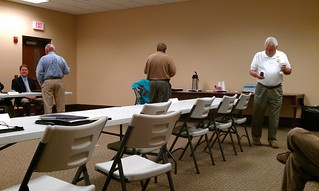Hahira declared a moratorium on water and sewer taps in a subdivision
financed by Guardian Bank, apparently in hopes of getting the bank
to do something about a drainage problem there.
 Instead, the bank is suing Hahira, echoing a lawsuit the county is pursuing
about a contract let when the bank’s Chairman was Lowndes County Chairman.
Instead, the bank is suing Hahira, echoing a lawsuit the county is pursuing
about a contract let when the bank’s Chairman was Lowndes County Chairman.
According to Stuart Taylor in the VDT Friday, Guardian Bank’s chairman said, perhaps using the royal “we”:
“We’re a little disappointed with Hahira,” said Ashley Paulk, Chairman of the Board of Directors for Guardian Bank. “We’ve actually helped them build up their tax base up there…Over the years, we’ve encouraged builders to be up there.”
Me, I think Hahira should have
 charged high enough tap fees or impact fees
to cover such things, but
previously (2 August 2012)
they
declined to do that.
I believe in their discussion some of the Hahira City Council mentioned
they didn’t want to change the fees just before a new subdivision paid them.
Could it be that same subdivision?
charged high enough tap fees or impact fees
to cover such things, but
previously (2 August 2012)
they
declined to do that.
I believe in their discussion some of the Hahira City Council mentioned
they didn’t want to change the fees just before a new subdivision paid them.
Could it be that same subdivision?
The suit claims that the City was notified of the potential for a drainage problem last August but did not act on it, continuing to collect tap and sewer fees in the meantime. The suit also claims that Hahira city officials have admitted that the moratorium was an attempt to gain leverage on Guardian in the hopes that Guardian would fix and repair the drainage problem in Lawson Farms. The lawsuit defines this as “malice,” claiming that the council knew the moratorium “would have a substantial, negative financial impact” on Guardian.
“Last August” sounds like the same subdivision, but it’s not. According to the 2 August 2013 minutes the Council talked about Gateway Pines and this lawsuit (according to the VDT) is about Lawson Farms. Nonetheless, the opponents (motion to raise tap fees from $3,000 to $5,000 failed 3 to 2) stated concerns about discouraging builders. Looks like not raising the fees didn’t do Hahira any good, because they’re getting sued anyway.
Declaring the moratorium unconstitutional, the lawsuit seeks its elimination, stating “the City, by passage of this unlawful Moratorium has substantially interfered with Plaintiffs’ property interests in a manner that constitutes a taking of private property without just compensation.”
 Where was all this constitutional concern when Ashley Paulk’s
Lowndes County Commission was passing
arguably unconstitutional bills of attainder?
Where was all this constitutional concern when Ashley Paulk’s
Lowndes County Commission was passing
arguably unconstitutional bills of attainder?
According to Paulk, Guardian attempted to sit down with council members to talk things out, but were told by one member that they would be tied up forever.
 Ah, the irony.
Ashley Paulk as Chairman of the Lowndes County Commission
refused to negotiate with Hahira and the other cities about LOST,
which is how
that’s ended up in the courts.
Now he complains Hahira refused to negotiate about tap fees!
Ah, the irony.
Ashley Paulk as Chairman of the Lowndes County Commission
refused to negotiate with Hahira and the other cities about LOST,
which is how
that’s ended up in the courts.
Now he complains Hahira refused to negotiate about tap fees!
Repeated attempts were made through both phone and email to contact James Thagard, the attorney representing the City of Hahira in this suit, but The Times was unable to reach him. Hahira officials refused to comment and Hahira City attorney Rob Plumb had a conflict of interest and could not represent the city in this matter.
Could Rob Plumb’s conflict of interest be that he’s the attorney for
 Deep South Sanitation, whom
Lowndes County is suing
on behalf of an
exclusive franchise
that was passed by the Commission when Paulk was Chairman?
Deep South Sanitation, whom
Lowndes County is suing
on behalf of an
exclusive franchise
that was passed by the Commission when Paulk was Chairman?
Guardian is also seeking “just compensation for the taking of their property interest in an amount which shall be proven at trial” and “attorneys’ fees and costs associated with the bringing this action.”
Maybe Deep South Sanitation’s legal defense should try that argument.
-jsq
Short Link: